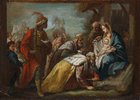
"Saint Caspar (otherwise known as Casper, Gaspar, Kaspar, and other variations) along with Melchior and Balthazar, represents the wise men (Biblical Magi, usually taken as three in number) mentioned in the Bible in the Gospel of Matthew, verses 2:1-9. Although the Bible does not specify who or what the Magi were, since the seventh century, the Magi have been identified in the Western Church as Caspar, Melchior and Balthasar. Caspar and the other two are considered saints by the Catholic Church.
The name Caspar or Casper is derived from Gaspar which in turn is from an ancient Chaldean word, "Gizbar", which according to Strong´s Concordance means "treasurer". The form "Gizbar" appears in the Hebrew version of the Old Testament Book of Ezra (1:8). In fact, the modern Hebrew word for "treasurer" is still "Gizbar". By the 1st century B.C. the Septuagint gave a Greek translation of "Gizbar" in Ezra 1:8 as "Gasbarinou" (literally: son of "Gasbar"). The transition from "Gizbar" to "Caspar" and "Kaspar" can thus be summarized as: Gizbar>Gasbar>Gaspar>Caspar>Kaspar (with "C" being a misreading of the manuscript "G" and "K" having the same phonetic value as "C"." - (Wikipedia (en) 12.11.2019)
 )
)